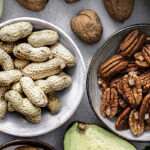How Does the Keto Diet Impact Sleep?
No carb diets were made popular in the 90s with the Atkins diet. Today, the ketogenic (keto) diet reigns supreme with over 25.4 million Google searches in 2020 alone. The desire to lose weight, slim down, and look good drives people to do drastic things – like cutting carbohydrates from their diets. But the keto diet doesn’t just help you drop stubborn pounds. It can also have some pretty unpleasant and serious side effects including
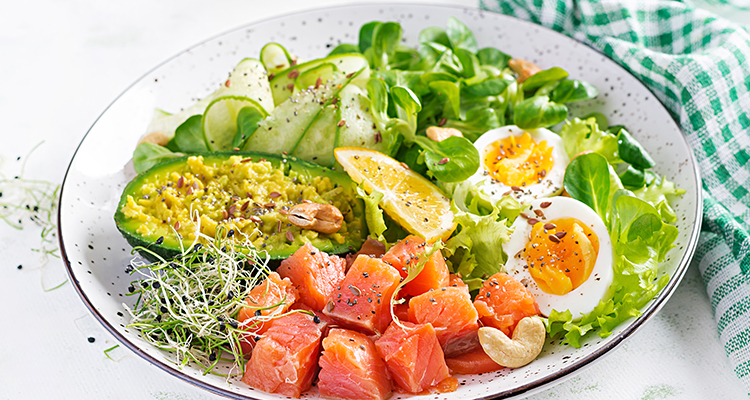
Content
What is the Keto Diet and How Does It Work?
The keto diet involves restricting carbohydrates and protein while consuming high levels of good fats. Your body processes carbohydrates and other foods before turning them into glucose. It then uses glucose like fuel to give your body energy. When you run out of glucose, your body taps into a secondary energy source known as ketones. Ketones are produced by your liver from fat. Using ketones for energy is a process called ketosis. Now, your body is burning stored fat for energy.
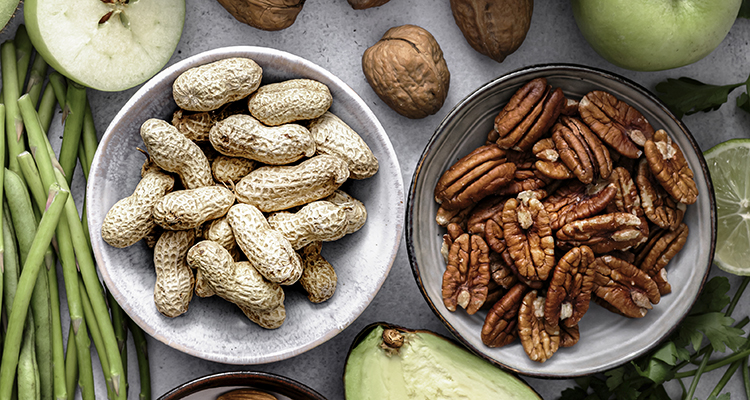
The best and fastest way to get your body into ketosis is to reduce the number of glucose stores you have. Because glucose comes from carbohydrates and proteins, that means drastically limiting these from your diet. It’s important to note that your body is constantly generating ketones. But when you follow a keto diet, these ketones replace glucose as your body’s main source of energy, helping you burn fat faster. Switching from glucose to ketones takes a few weeks and can be difficult to maintain long term. It’s a hard balance to keep since even a small spike in carbohydrates or protein can shift your body out of ketosis and cause unwanted weight gain.
Some people experience what’s called the “keto flu” during the first few weeks of adopting this new lifestyle. Symptoms generally appear between two and seven days after starting the diet and include headache, irritability, nausea, brain fog, constipation, body fatigue, and difficulty sleeping. A variety of factors determine whether or not you’ll experience these symptoms and to what severity including genetics, your level of carb dependency, electrolyte loss, and dehydration. Irritability and frustration can make it increasingly difficult to fall asleep, while lack of sleep can worsen mood swings, creating a negative cycle. Most people who make it past the first few weeks of starting a keto diet claim these symptoms subside, with some even reporting better sleep quality (more on this later).
The keto diet isn’t for everyone due to its restrictiveness. It’s also not recommended for anyone with the following conditions:
- Heart disease
- Women who are pregnant or nursing
- Type 1 diabetes
- Pre-existing pancreatic or liver conditions
- Anyone who has had their gallbladder removed
If you’re in good health and are considering the keto diet for weight loss, here are a few things you may need to do.
- High fat intake (eat a diet that’s 80%-90% fat)
- Monitor your protein intake (excess protein converts into glucose, preventing your body from entering ketosis)
- Eat minimal carbohydrates, including fruit (your carbohydrate intake will remain between 20 and 50 grams per day)
- Test yourself to stay in ketosis (this isn’t required but many people test their level of ketones using urine, blood, or oxygen tests)
There are also different versions of the keto diet. The typical plan involves eating very limited carbs, a medium amount of protein, and high amounts of fat. The ratio is about 5% carbs, 20% protein, and 75% fat. These foods are considered “good fats” and include things like avocado, olive oil, nuts, nut butter, chia seeds, and flaxseed. Not only are most fruits off-limits when following this plan but so are starches, including starchy vegetables including corn, potatoes, green peas, and squash.
Not all keto diets limit your carb intake this drastically. A few other options include:
- Cyclical keto: involves different periods where you eat higher amounts of carbohydrates
- Targeted keto: you add more carbohydrates to your diet on the days you exercise
- High protein keto: the ratio of fat drops to 60% and your intake of proteins increase to 35%
These different options are one reason the keto diet has become so universally appealing.
Common Side Effects of Keto: Pros and Cons
As with any diet, there are pros and cons to keto. Let’s take a closer look at what you can expect before adopting this low-carb lifestyle.
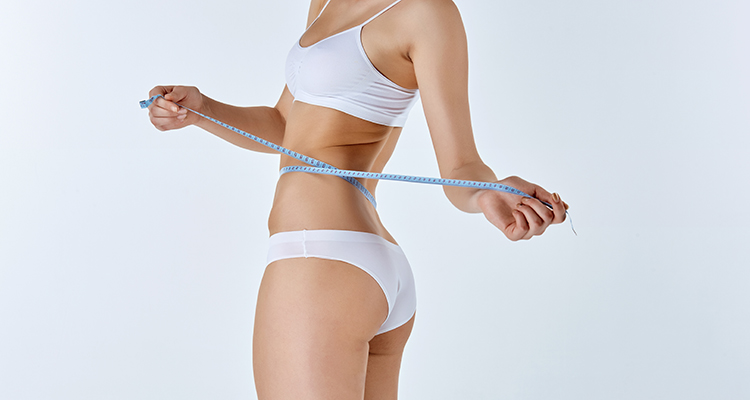
Pros
Millions of people can’t be wrong. The keto diet wouldn’t be as popular as it is without some positive side effects. Let’s take a look at some of the most common.
Weight Loss
This is the most obvious benefit of adopting a keto diet. Most people lose an average of 1 to 2 pounds on keto consistently. Surprisingly, they also report feeling less hungry and restricted than they have on other diets. Science suggests this is because it takes your body longer to break down fatty foods, helping you feel fuller, longer. Reducing the number of calories you eat is another major contributor to weight loss on keto.
A Non-Low-Fat Option
The fact that you can burn fat by eating more of it makes the keto diet appealing to most people. Unlike other low-fat diets, keto lets you eat as many healthy fats as you want including high-fat foods like red meat, cheese, butter, nuts, and fatty fish.
Additional Health Benefits
While the keto diet isn’t recommended for certain people, it may actually improve the health of others. These include reduced seizures in individuals with epilepsy, fewer symptoms in patients with progressive neurological disorders including Parkinson’s disease, and increased endurance for athletes.
Cons
While there are proven benefits of a low-carb, high-fat diet like keto, there are plenty of cons and risk factors to consider.
Difficult to Sustain
One of the main reasons people quit any diet is that it’s unsustainable. This is especially true for the keto diet, which focuses on an extreme caloric reduction and restricts a variety of foods. Most people use the keto diet to kickstart their weight loss before switching to a more reasonable lifestyle. Another factor that makes sticking with keto tricky is how easy it is to switch in and out of ketosis. Tracking this and slipping back and forth can become frustrating and defeating for some people.
Risk of Food Obsession
To stay in ketosis, you need to closely monitor your food intake. This puts you at risk of developing an unhealthy obsession with food. Micromanaging your diet also creates a disconnect between what you “should” be eating and what your body needs, including natural hunger cues. Food obsession can also cause
psychological distress and negative feelings of shame. You may find yourself binge eating only to feel guilty and then return to a more restricted diet before you slip up again. This yo-yo dieting is unhealthy for both your mind and body.
Negative Effects on the Heart
While a high-fat diet might help you lose weight, it can negatively affect your heart. According to the American Heart Association, healthy adults should limit saturated fats to between 5% and 6% per day. Eating higher than this amount regularly puts you at risk of developing heart disease and other cardiovascular complications. What’s even more shocking is that individuals following a keto diet for as short as six weeks saw an increase in fat levels in the blood.
Nutrient Deficiency
Fewer calories don’t just lead to more weight loss. It can also cause a nutrient deficiency if you’re not getting enough vitamins, minerals, and fibers from the foods you eat. Because your food choices are limited when following a keto diet, many people lack adequate nutrition. This can cause a slew of health issues and complications that leave you feeling low on energy and unable to function in daily life. This includes concentrating, sleeping, and performing physical tasks.
How the Keto Diet Impacts Sleep
Sleep is one of the first things affected by starting any new diet and the keto diet is no different. But are these changes all bad? Let’s take a closer look at how keto affects sleep both short- and long-term.

Insomnia
The inability to fall and stay asleep (insomnia) is common during the first several weeks of starting the keto diet. For some people, these symptoms rarely subside until they try a different type of keto diet or return to their normal eating habits.
We already said that carbohydrates produce glucose and act as the body’s main source of energy. This constant supply of glucose also provides the brain with an essential amino acid known as L-tryptophan. L-tryptophan helps the brain produce an important hormone – serotonin – which promotes relaxation, happiness, sleep, and an overall sense of wellbeing. This helps ward off feelings of depression and helps keep you awake and alert during the day. As night falls, serotonin converts to the sleep hormone melatonin, preparing your body for rest.
The low-carb keto diet can cause a dip in L-tryptophan, hindering the production of both serotonin and melatonin. This can make it difficult to fall and stay asleep and may trigger mood swings. Another reason some people find it difficult to sleep while on keto is that once your body adjusts and makes the switch from glucose to ketones, you may actually have MORE energy and faster metabolism. While this is good for weight loss, it’s not so great for sleep. You’ll feel more alert and energized, even at night, which can cause delayed sleep onset.
Changes in the REM Cycle and Slow Wave Sleep
A low-carb diet like keto can impact your sleep patterns in several ways. One study showed that while REM sleep declined in patients, slow-wave sleep increased. REM sleep is arguably the most important stage in your sleep cycle and occurs approximately 90 minutes after you fall asleep. It’s when your brain processes information, including memories. It’s also linked to learning and is the stage of sleep when you dream.
When you don’t spend enough time in REM sleep, it can cause several health problems. This includes cognitive disorders, mood disorders, and problems with concentration. Some studies suggest that less REM sleep can worsen sleep disorders including narcolepsy and sleep apnea.
Hunger Pangs
While it’s not recommended you eat a heavy meal right before bed, low caloric intake associated with the keto diet can lead to some pretty serious hunger pangs at night. So much so, that they might wake you up reaching for a snack. For many people, this is a short-term response to a sudden change in their eating habits. Over time, most people on keto feel more satiated.
If you do need a snack, opt for something light and filling and avoid foods high in sugar or anything containing caffeine. You may also need to adjust the type of keto diet you’re following by adding additional calories. Staying hydrated is another important factor and can ward off hunger pangs while also helping you sleep better. Be careful not to drink too much water though, or else you’ll be waking up frequently to use the bathroom.
Sleep Disorders
Keto has been associated with certain sleep disorders, including insomnia and sleep apnea. Some people report sleepwalking while on keto, but in most cases, these symptoms are short-lived. If you have a pre-existing sleep disorder, keto might worsen symptoms so be sure to talk to a healthcare professional before drastically limiting your carb intake.
Increased Awareness and Improved Slow Wave Sleep
When it comes to sleep, keto isn’t all bad. Once the initial insomnia symptoms wear off, many people report sleeping better and more deeply. You may also experience increased daytime alertness and awareness, making it easier to fall asleep at night. This increase in energy is due to a chemical in the brain known as adenosine. Adenosine is involved in regulating sleep. Certain studies suggest that a keto diet promotes increased production of this chemical helping stabilize sleep patterns. Adenosine also helps regulate your central nervous system and may lead to deeper slow-wave sleep, which is the deepest, most restorative sleep stage.
Tips for Sleeping Better While on the Keto Diet
Despite the risk factors and side effects, many people swear by the keto diet. If you want to try this low-carb lifestyle but don’t want to compromise your sleep, this list of tips might help.

Start Your Day with Exercise
Most people combine diet and exercise to lose weight. If you’ve decided to try the keto diet, you may be considering a new exercise routine also. This is a great idea, especially if you’re concerned with achieving quality sleep (as you should be!).
Studies show that starting your day with exercise helps you feel more tired at night, allowing you to fall asleep faster and sleep longer and deeper. Physical activity may also combat those pesky mood swings associated with the “keto flu”. Avoid working out too close to bedtime, which may cause an unwanted spike in energy. And be sure to eat your allotted carbohydrates and drink plenty of water when combining keto and moderate to intense exercise.
Incorporate Mindfulness and Meditation
Both mindfulness and meditation are credited with reducing stress, improving your overall mood, and promoting quality sleep. When you’re feeling frustrated or irritable during those first few weeks of starting a keto diet, these two relaxation techniques can help.
While meditation and mindfulness are often referred to interchangeably, they’re actually two different things with equally impressive benefits. Meditation focuses on eliminating thoughts and becoming aware of “no-thing”, while mindfulness is about becoming more aware of your thoughts, or “something-thing”. Try incorporating these practices into your daily routine. Both meditation and mindfulness can help your body unwind and clear your head for sleep. You may also find increased mental clarity during the day, which can reduce fogginess and lack of concentration from lack of carbs and energy.
Reduce Distractions at Night
In an effort to fall asleep many people turn to their smartphones or television as a way to relax. While these digital devices offer “mindless” entertainment that helps you destress, they also emanate a blue light that could interfere with your ability to fall and stay asleep.
A keto diet already affects your body’s serotonin and melatonin levels. The blue light from screens also tricks your brain into thinking it’s daytime, which stops melatonin production. Now, you have two things inhibiting your body from producing an important sleep hormone. Avoid using electronics 90 to 60 minutes before you go to sleep. And while you’re at it, remove other illuminating displays from your room like digital clocks and other electronics.
Eat Carbs Later in the Day
You’re allowed a few carbs on your keto diet and you’ll savor them! If possible, enjoy these delicious indulgences later in the day instead of first thing in the morning. Remember those hunger pangs mentioned earlier? When you schedule your daily carb intake about four hours before you go to sleep, you may sleep better and are less likely to wake up hungry. This window of time also gives your body enough time to use up the energy you get from those carbs while also getting a much-needed dose of serotonin.
Don’t Be Afraid to Adjust Your Diet
No two people will respond to keto the same way. While many people follow the traditional diet, there are alternatives for a reason. Don’t be afraid to use them. If you’re a very active person, the targeted keto diet might be better for your lifestyle. This allows you to increase your carbs on active days.
Remember, too, that sleep is an important part of weight loss. Studies show that people who get adequate sleep are 33% more likely to lose weight than those who don’t sleep enough. So think of a good night’s sleep as one more way to support your weight loss goals.
Create the Ideal Sleep Environment
Difficulty falling and staying asleep plagues both newcomers to keto and those who’ve been on the diet for months or even years – just for different reasons. Insomnia during the early stages is usually due to the extreme change in your diet, whereas seasoned keto dieters now experience increased energy and faster metabolism, causing them to feel alert more often than not.
Regardless of what’s keeping you up at night, creating a welcoming, comfortable sleep environment makes it easier to fall and stay asleep. Start by investing in room darkening shades or a sleep mask to prevent unwanted light from waking you up. Reduce noise disturbances using an oscillating fan or sound machine. Treat yourself to high-quality bedding including a comfortable mattress, pillows, and sheets. The temperature of your bedroom is important too. The ideal temperature for sleeping is between 60 and 67 degrees. Set your thermostat accordingly and avoid wearing heavy pajamas or piling on the blankets. This can lead to night sweats and frequent awakenings.
Avoid Unhealthy Stimulants
You probably eliminated a lot of unhealthy habits and behaviors after adopting a keto diet and embarking on your weight loss journey. But it’s important to remember that everything from alcohol and cigarettes to caffeine can not only derail your diet but also keep you up at night.
If you rely on caffeine to help you feel more awake and alert in the morning, try limiting your intake to one or two servings. Don’t drink caffeinated beverages after 3:00 p.m. This includes coffee, tea, energy drinks, and soda.
While it’s no secret that smoking cigarettes are bad for your overall health, did you know that nicotine is a stimulant? Smoking cigarettes not only compromises your respiratory system but could be interfering with your sleep patterns. Now’s as good a time as any to ditch that bad habit!
If you use alcohol to help you relax and unwind from a hectic day, you may be sabotaging your sleep without realizing it. While alcohol does have a sedating effect at first, once this wears off, you may find yourself restless, alert, and dehydrated. Alcohol is another contributing factor to sleep apnea and snoring because it relaxes the muscles in your throat, causing dangerous pauses in breathing and frequent awakenings. Always drink alcohol in moderation and don’t use it as a form of insomnia treatment.
Balance Your Electrolytes
Many people lose precious electrolytes while on the keto diet. These minerals play an important role in the body by supporting hydration, boosting energy, and promoting healthy cells. They’re also needed for achieving quality sleep. Not only do electrolytes reduce insomnia symptoms but they prevent leg cramps and improve overall sleep quality.
One way to improve sleep and boost your electrolytes at the same time is by taking an Epsom salt bath before bed. This salt contains high levels of magnesium, which your body absorbs directly through the skin during your soothing, warm soak. Add a few drops of chamomile essential oil to further promote relaxation and sleep. Drinking bone broth is popular on keto because it not only helps your body maintain healthy electrolyte levels but it contains an amino acid known as glycine, which is linked to better sleep quality.
Lose Weight While Getting Adequate Sleep
If you want to lose weight and get healthy, you shouldn’t have to compromise your sleep. In fact, the most successful diets include plenty of deep, restorative sleep. Unfortunately, some diets that focus on extreme food restriction and caloric deficits can interfere with your body’s natural ability to fall and stay asleep.
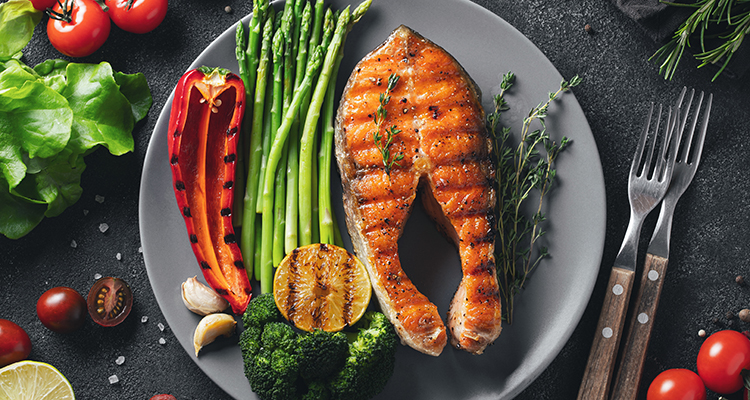
At Somnus Therapy, we can help. With an individualized approach to treating a variety of sleep disorders, you’ll learn to identify, accept, and treat your specific condition from the comfort of your home. Our online therapy program is convenient, comprehensive, and easy to use.
Click here to learn more about our methods and get started on the road to a better night’s sleep today!

